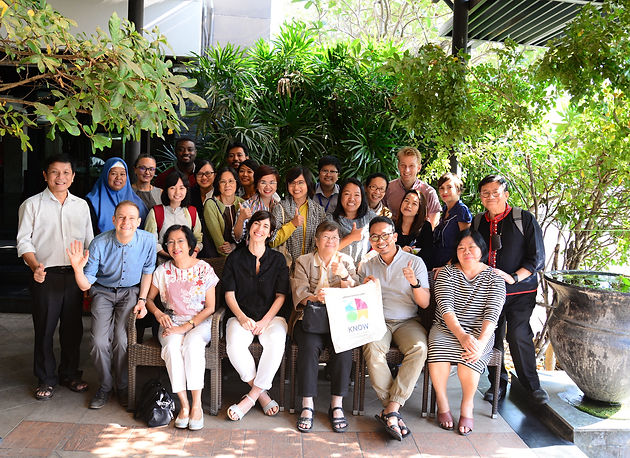Advancing community-led development as a pathway to urban equality
This blog, authored by Emmanuel Osuteye, Camila Cociña, Barbara Lipietz, Alexandre Apsan Frediani of the the Knowledge in Action for Urban Equality (KNOW) project, showcases the outcomes of a recent workshop in Thailand with its partner, the Asian Coalition for Housing Rights (ACHR). This is part of its collaborative work with local organisations in cities across Africa, Asia and Latin America. This blog was reposted from the KNOW website: all images are by David Heymann.
 The Asian Coalition for Housing Rights (ACHR) is a network of grassroots groups, activists, NGOs and professionals that works in the Asian context supporting various community-driven processes. For thirty years, ACHR has worked pushing for people-centred, citywide upgrading processes, organising collectives, negotiating land, building institutional alliances, and producing and exchanging community-led knowledge and urban development practices. The collective experience of ACHR has been, over the years, a fundamental inspiration for the Development Planning Unit (DPU), with a long history of collaboration and mutual learning through research, MSc students’ field trips, internships, workshops and exchanges.
The Asian Coalition for Housing Rights (ACHR) is a network of grassroots groups, activists, NGOs and professionals that works in the Asian context supporting various community-driven processes. For thirty years, ACHR has worked pushing for people-centred, citywide upgrading processes, organising collectives, negotiating land, building institutional alliances, and producing and exchanging community-led knowledge and urban development practices. The collective experience of ACHR has been, over the years, a fundamental inspiration for the Development Planning Unit (DPU), with a long history of collaboration and mutual learning through research, MSc students’ field trips, internships, workshops and exchanges.
As part of the KNOW project, ACHR is coordinating research in four cities of the Southeast Asian region, seeking to consolidate a network of co-learning and knowledge co-production towards urban equality. Putting community-led knowledge production at the centre, the four research projects are based in Da Nang (Vietnam), Nakhon Sawan (Thailand), Yangon (Myanmar), and Yogyakarta (Indonesia). In each of these cities, diverse teams of community members, professionals, activists and academics will produce and consolidate knowledge about urban communities and urban development processes, seeking to bring about change to the systems and practices that affect the living conditions of the urban poor.
During the last week of January 2019, the first ACHR/KNOW workshop took place in the city of Nakhon Sawan. Nakhon Sawan is the first and most successful case of citywide upgrading process in Thailand developing long-term, comprehensive solutions to problems of land and housing, with a 20-year history of collaboration between community networks, the local Municipality, and the national Baan Mankong programme (“Secure housing” in Thai), led by the Community Organizations Development Institute (CODI). Currently, the totality of informal settlements in the city are grouped under a recognised organisation, the Nakhon Sawan Community Network, with ongoing processes of upgrading in most of them. Being hosted by a city and community groups that have shaped such an inspiring experience was a meaningful component of the workshop, providing participants with the opportunity to learn from a rich and insightful trajectory, along with opening up spaces for sharing and exchange.

The workshop brought together representatives from each of the four cities, as well as members of the ACHR Secretariat facilitating the activities, led by Somsook Boonyabancha, in collaboration with Minh Châu Tran and Brenda Pérez Castro. The activities were co-facilitated by KNOW researchers Barbara Lipietz,Alexandre Apsan Frediani, Emmanuel Osuteye and Camila Cociña, as well as KNOW communication officer David Heymann. This was a significant team building exercise, and during the days together, we held discussions, presentations and debates that helped shape collectively a research agenda for KNOW.
The open structure of the workshop allowed for focused discussions on the specific value of ACHR’s approach to co-learning and how it can support the formation and sustenance of pathways to urban equality as a common objective, across the diversity of contexts, cases, capacities and agency in the four cities. Collective discussions also centred on the desired outcomes and impacts of the city-based research and ways in which ACHR as a network operating at multiple scales can support and enhance these processes. It is expected that these initial conversations will be continued and more details on process, methods and documentation fleshed out over the coming months, to ensure that all city teams commence field activities by June 2019, based on a road map collectively agreed upon.

The working week was also an opportunity for the team to visit some of the neighbourhoods, interact with residents and see first-hand some projects that have been developed in Nakhon Sawan under the Baan Mankong programme and their citywide community engagement experience. The visit was also marked by the signing of a Memorandum of Understanding (MoU) between the Municipality of Nakhon Sawan, ACHR, CODI, the Nakhon Sawan Community Network, and DPU, committing the different parties to the implementation of the ACHR/KNOW project in the city.